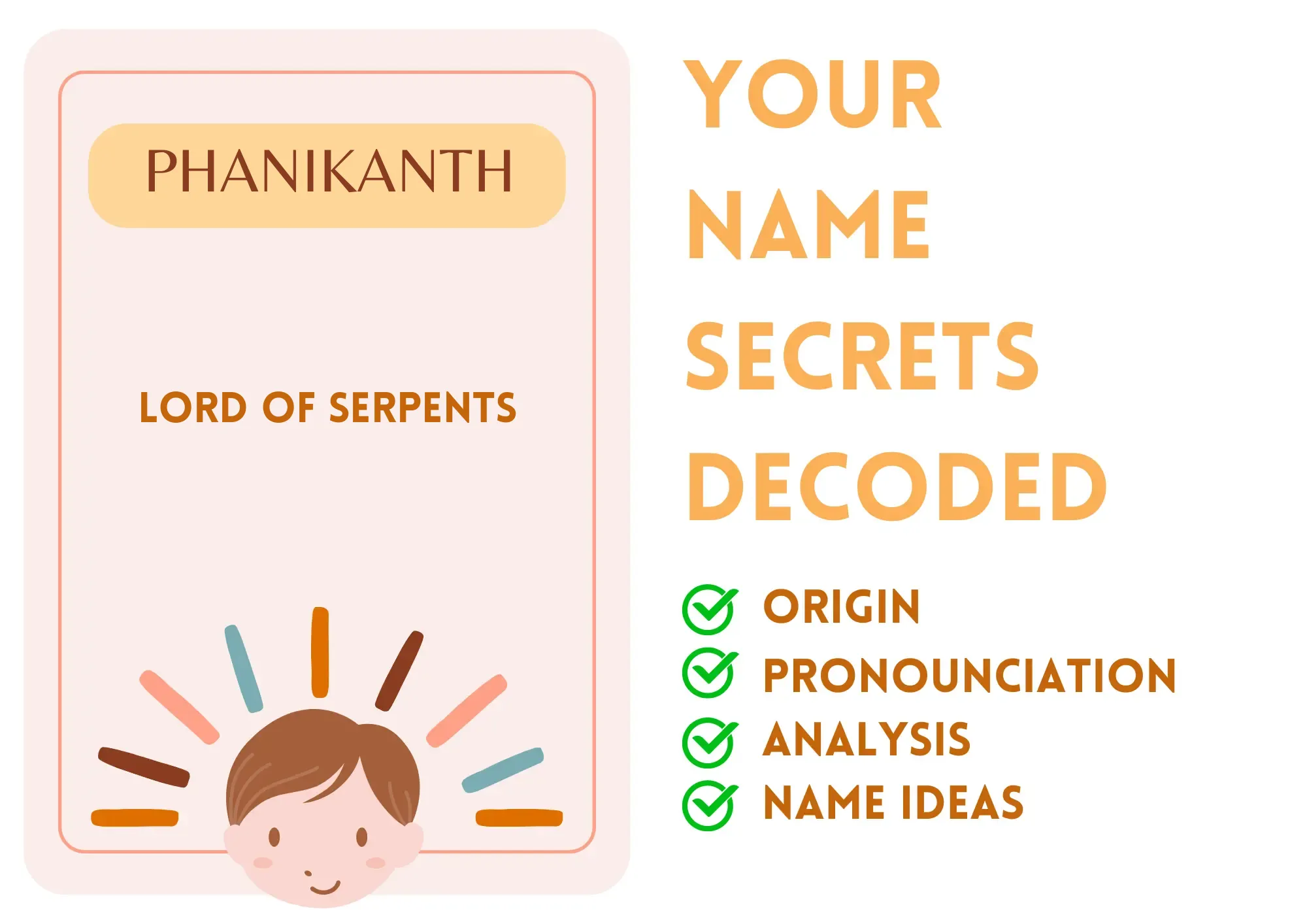
Phanikanth
Phanikanth is a culturally significant name of Indian origin, translating to 'Lord of the Serpents' (from Sanskrit). The name is predominantly masculine and is widely used in South India, particularly among Telugu-speaking communities. It holds a revered place in Hinduism as it refers to Lord Shiva, who is often depicted with a snake around his neck, symbolizing power and control over fear.
Phanikanth is perceived as a strong and unique name, associating individuals with valor and divine wisdom. While it may take some getting used to for non-Indian speakers, it remains easy to pronounce once familiarized. Common nicknames might include Phani or Kanth.
The name does not have significant representation in popular culture but is respected in religious texts and regional folklore, emphasizing its cultural depth. Parents who choose this name may feel a strong connection to their heritage and spirituality.
Basic Information
Gender: Boy
Sounds Like: fah-nee-kahnt
Pronunciation Explanation: The emphasis is placed on the second syllable, pronounced like 'nee', and the last part is pronounced like 'kahn' followed by 't'.
Summary and Meaning
Meaning: Lord of serpents
Origin: Phanikanth has Indian origins, specifically linked to Hindu culture and the Sanskrit language.
Usage: Phanikanth is traditionally a masculine name and is rarely used for females.
Name Number (Chaldean)
Name Number (Pythagorean)
Name Constellation (Nakshatra)
Name Zodiac Sign (Rashi)
Popularity (Global Rank)
Overall: 221848
Boys: 72681
Most Popular in
Religious and Cultural Significance
Religion: Hindu
Background: In Hinduism, Phanikanth relates closely to Lord Shiva, revered for his role as a protector and ultimate power, often associated with serpents as symbols of protection and mystery.
Cultural Significance: Phanikanth is popular among families looking to honor tradition and convey strength and divinity, making it a favored choice for male children.
Historical Significance: Phanikanth represents themes of divinity, strength, and protection within Hindu mythology and is tied to various stories involving Lord Shiva's form and teachings.
Popular Culture
Literature and Mythology: Although not prominent, the name Phanikanth sometimes appears in regional stories and folklore referencing Lord Shiva.
Movies and Television: The name may appear in Indian films portraying mythological narratives or characters connected to divine attributes.
Feelings and Perceptions
Perception: Generally perceived positively, Phanikanth is viewed as a strong, sturdy name with deep spiritual implications. It evokes feelings of heritage and respect.
Positive Feelings: Unique, powerful, spiritually significant, culturally rich.
Negative Feelings: May be considered unusual or difficult to pronounce for those unfamiliar with Indian names.
Practical Considerations
Ease of Writing and Calling: Phanikanth, consisting of eight letters and three syllables, may take some time for non-native speakers to master, but is straightforward once learned.
Common Typos and Misspellings: Phanikant,Phanikanthh,Phanikanth,Phanikanth
Common Nicknames: Phani,Kanth,Phanu
Phanikanth Popularity
Phanikanth Usage and Popularity By Country
| Country | Rank (Overall) |
|---|---|
| India | 47319 |
| Belgium | 48129 |
| United States | 262335 |
Compatibility Analysis
Famous Persons Named Phanikanth
No results found for Phanikanth.
Related Names
Similar Sounding Names:
Kanth,Srikant,Rajkanth